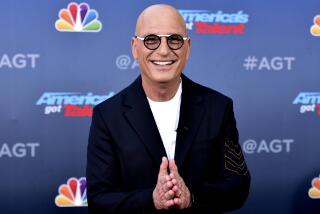Barry’s Collapse on Trip to L.A. Alleged : Narcotics: Friend testifies that the mayor was hospitalized after using cocaine during his visit in 1987 to attend the Super Bowl.
- Share via
WASHINGTON — Mayor Marion Barry collapsed from an apparent cocaine overdose during a 1987 trip to the Super Bowl in Southern California and had to be hospitalized, a lawyer said at Barry’s cocaine and perjury trial Wednesday.
Attorney Lloyd Moore, a friend of Barry’s who said that he had used cocaine repeatedly with the mayor, testified that he learned of Barry’s collapse in a phone call from another Barry associate, Arthur (Jeff) Mitchell. Mitchell had accompanied Barry to Los Angeles.
Mitchell “indicated that they had smoked . . . cocaine laced with something,” Moore said of the January, 1987, phone call. “Mr. Barry was very sick. They thought he was going to die.”
Moore said that Barry’s office put out a cover story that the mayor had been hospitalized at the Daniel Freeman Memorial Hospital in Inglewood for a hiatal hernia. The Super Bowl that year was played in Pasadena’s Rose Bowl. Moore did not specify where Barry had experienced his illness.
He testified, however, that Mitchell told him he would not allow hospital employees to take a blood sample from the mayor, apparently out of fear that his drug use would be discovered.
Moore, whom Barry appointed to two low-level city commissions, and a woman friend of Barry’s gave jurors new firsthand accusations involving Barry’s alleged long-term drug use. Moore said that beginning in 1986 he invited the mayor repeatedly to use his home to snort cocaine and that the two men did so.
Meanwhile, Theresa Southerland, 27, testified that she twice vacationed with Barry in the Bahamas and used cocaine with him in his beachfront Nassau hotel room in 1987 and 1988.
Southerland, the second woman to testify that she was the mayor’s girlfriend and used drugs with him, said that Barry would scoop up the powdered drug with a business card and inhale it.
Earlier in the trial, former model Rasheeda Moore testified that she had a love affair with Barry and had used cocaine, marijuana and opium with him more than 100 times. Moore cooperated with the FBI last January in a “sting” operation in which Barry was arrested after being secretly videotaped in a hotel room smoking crack cocaine.
Prosecutors are seeking to pile up evidence of Barry’s alleged long-term drug use to counter defense arguments that the FBI entrapped Barry. Proof that a defendant was predisposed to commit a crime by virtue of his past conduct is the best defense against charges that he was entrapped, according to federal authorities.
Defense attorney Robert Mance did not try to challenge Southerland’s testimony about Barry’s drug use or her statement that they had had “an intimate relationship” for nearly two years. But Mance brought out that Southerland had been using cocaine for about a year before she met Barry at a local nightclub in 1986.
Both Southerland and Moore have said that they expect to avoid prosecution on drug charges themselves by cooperating with federal officials in the Barry case.
Barry, 54, who announced last month that he will not seek an unprecedented fourth term as mayor, is facing 10 misdemeanor drug-possession charges, a misdemeanor charge of conspiracy to possess drugs and--more seriously--three felony charges of lying under oath for telling a federal grand jury that he did not use drugs.
Southerland was asked to describe the first time she was alone with Barry at a friend’s house in November, 1987.
“I came over,” she said. “We had a couple of drinks. We talked. We listened to music. I went to the bathroom. I came back and cocaine was on the table.”
She said that she and Barry snorted the powdered drug and that thereafter she usually supplied the cocaine herself at get-togethers in private homes, apartments, on pleasure boats and in the Bahamas.
Under questioning by associate prosecutor Judith Retchin, Southerland said: “I used my own money” to buy the cocaine and that Barry never reimbursed her.
More to Read
Sign up for Essential California
The most important California stories and recommendations in your inbox every morning.
You may occasionally receive promotional content from the Los Angeles Times.













